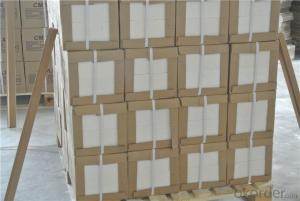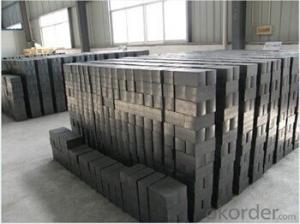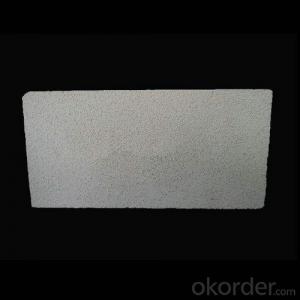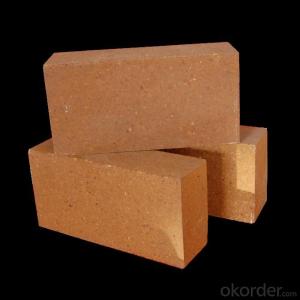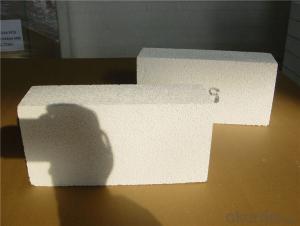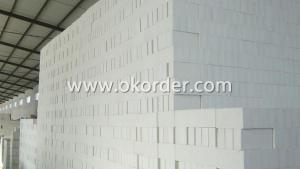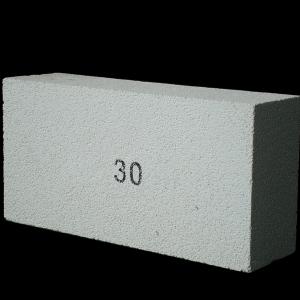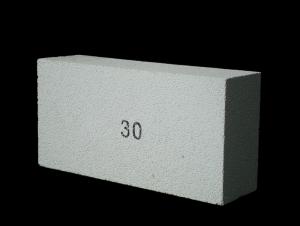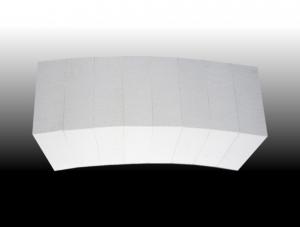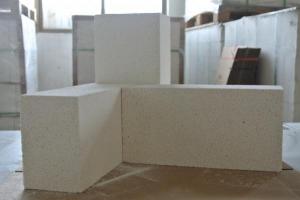GJM 23 Light Dense Mullite Insulation Brick Product
- Loading Port:
- Shanghai
- Payment Terms:
- TT OR LC
- Min Order Qty:
- 1 m.t.
- Supply Capability:
- 10000 m.t./month
OKorder Service Pledge
OKorder Financial Service
You Might Also Like
Thermal Insulation Fire Clay Brick
Refractory brick is a refractory material used in lining furnaces, kilns, fireboxes, and fireplaces.
We provide high quality Refractory Fire Bricks that are used on wide range in the various industries like Cement, Glass and Steel. Refractory Fire Bricks are provided as per the quantity and specifications required by the customers. We provide an extensive range of Refractory Fire Bricks at reasonable prices that depend upon the quantity ordered.
Application
Insulating Fire Brick are used for the lining of converter, alternating current arc furnace, direct Current arc furnace and the ladle slag line, etc.
Company Advantage
(1)Long Insulating Fire Brick manufacture history: 25 years manufacturer
(2)Advanced equipment and good service
(3)Diversification of production standards: ISO ANSI FEPA JIS ASTM
(4)Flexible payment: T/T L/C D/P D/A
(5)Professional marketing team and after-sale service
Insulating Fire Brick main feature:
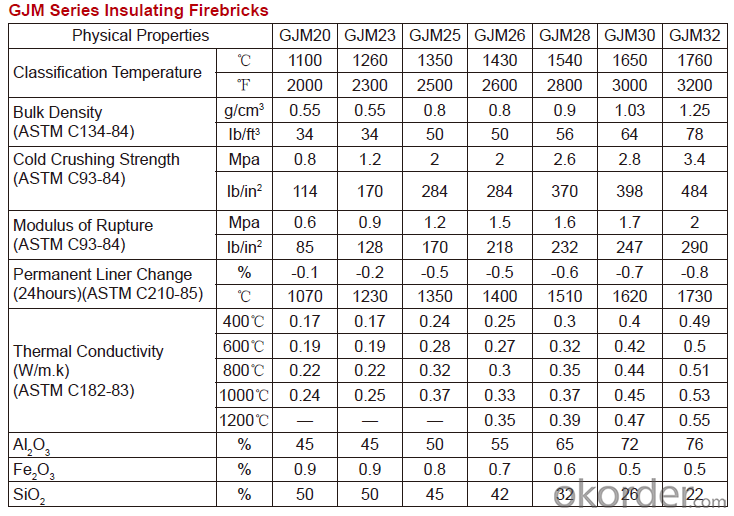
Equipment
1 unit of Ceramic Abrasive (SG Abrasive) pilot production line
2 units of Compact grain Abrasive pilot production lines
1 unit of high-end coated abrasives (abrasive cloth) production line
3 large flexible crushing and sieving lines for grit production lines
6 units of 5000KVA-10000KVA dumping type electric arc furnaces for Brown Fused Alumina fusion
FAQs
Q1 What’s the transport method?
A1 FCL delivery goods with wooden pallet or wooden case by sea; If LCL delivery, must with wooden case; Sometimes need open top, flat rack or bulk cargo.
Q2 What’s the required payment term?
A2 Generally 30% TT as the prepayment, 70% TT before delivery. If need, 100% Irrevocable Letter of Credit or negotiation.
Q3 Which country are our products exported to?
A3 Apart from entire Chinese market, the US, Russia, Japan, Korea, Australia and some Southeast Asian Nations.
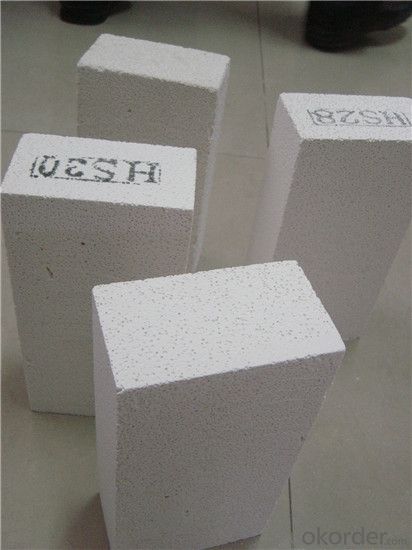
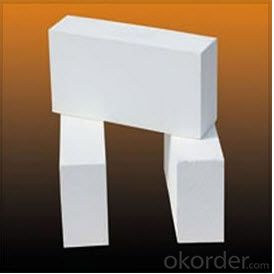
- Q:Are insulating fire bricks resistant to thermal spalling?
- Yes, insulating fire bricks are resistant to thermal spalling.
- Q:Can insulating fire bricks be used in the construction of boilers?
- Yes, insulating fire bricks can be used in the construction of boilers. These bricks have excellent thermal insulation properties, making them suitable for use in high-temperature applications such as boiler construction. They help to reduce heat loss, improve energy efficiency, and enhance the overall performance of the boiler system.
- Q:How do insulating fire bricks affect the overall weight capacity of a structure?
- Insulating fire bricks do not significantly affect the overall weight capacity of a structure as they are lightweight and have a low density. They are primarily used for their thermal insulation properties rather than providing structural support.
- Q:Can insulating fire bricks be used in the construction of glass bottle production furnaces?
- Yes, insulating fire bricks can be used in the construction of glass bottle production furnaces. Insulating fire bricks are designed to withstand high temperatures and provide excellent thermal insulation. They are often used in applications that require heat retention and energy efficiency, such as furnaces. By using insulating fire bricks in the construction of glass bottle production furnaces, the heat generated during the glass-making process can be effectively contained within the furnace, reducing heat loss and improving energy efficiency. This can result in cost savings and improved production performance. Additionally, insulating fire bricks can help protect the structural integrity of the furnace by minimizing thermal stress and preventing heat transfer to the surrounding environment. Overall, the use of insulating fire bricks in glass bottle production furnaces can contribute to more efficient and durable furnace operation.
- Q:Are insulating fire bricks resistant to electrical conductivity?
- Yes, insulating fire bricks are resistant to electrical conductivity. These bricks are made from materials that have low electrical conductivity, such as ceramic fibers or insulating refractory materials. The main purpose of insulating fire bricks is to provide thermal insulation, making them ideal for applications where high temperatures need to be contained. As a result of their low electrical conductivity, insulating fire bricks do not conduct electricity and are used to line electrical furnaces, kilns, and other high-temperature equipment where electrical insulation is required.
- Q:What are the bubble bricks?
- The requirements for production conditions are not high. Simple shed to plant products without open storage, warehouse, on the quality of workers is not high.
- Q:Can insulating fire bricks be custom-made?
- Yes, insulating fire bricks can be custom-made. Insulating fire bricks are typically made from lightweight materials such as vermiculite, perlite, or refractory fibers, which can be easily molded into various shapes and sizes. This flexibility allows manufacturers to create custom-made insulating fire bricks to meet specific requirements and applications. Customization options may include variations in dimensions, thermal conductivity, compressive strength, and density. By tailoring the composition and design of insulating fire bricks, they can be optimized for specific temperature ranges, insulation requirements, and environmental conditions. Therefore, customers can work with manufacturers to develop custom solutions that best suit their unique needs.
- Q:How do insulating fire bricks compare to other insulation materials?
- Insulating fire bricks are highly effective insulation materials that offer several advantages over other insulation materials. First and foremost, insulating fire bricks have excellent thermal properties, meaning they can efficiently prevent the transfer of heat. They have a low thermal conductivity, which allows them to effectively insulate against high temperatures. This makes them ideal for use in applications where heat retention is crucial, such as furnaces, kilns, and fireplaces. Compared to other insulation materials like fiberglass or mineral wool, insulating fire bricks are much more durable and long-lasting. They can withstand extremely high temperatures without losing their insulating properties or structural integrity. This durability makes them a cost-effective choice since they require less frequent replacement. Another advantage of insulating fire bricks is their ability to resist chemical attack and wear. They are resistant to acids, alkalis, and other corrosive substances, making them suitable for applications involving harsh chemicals or environments. Furthermore, insulating fire bricks have a high compressive strength, allowing them to bear heavy loads without cracking or breaking. This makes them suitable for use in structural applications where weight-bearing capacity is essential. In terms of installation, insulating fire bricks are easy to work with. They can be cut, shaped, and installed using basic tools, allowing for customization and flexibility in different applications. They are also lightweight, which simplifies the installation process and reduces the overall weight of the structure. Overall, insulating fire bricks offer superior insulation properties, durability, resistance to chemicals, and ease of installation compared to other insulation materials. Their ability to withstand high temperatures, resist wear and tear, and provide long-lasting insulation make them an excellent choice in various industrial and domestic settings.
- Q:Can insulating fire bricks be used in the construction of thermal storage units?
- Insulating fire bricks are indeed capable of being utilized in the construction of thermal storage units. These bricks possess a specific design that grants them exceptional insulation properties, rendering them an optimal selection for thermal storage units. They are crafted from lightweight materials with low thermal conductivity, enabling them to retain heat for extended durations. Thermal storage units serve the purpose of storing and discharging heat energy as required. The inclusion of insulating fire bricks aids in minimizing heat loss from the stored energy, thus ensuring efficient and effective thermal storage. Their remarkable insulation properties facilitate superior heat retention, thereby diminishing the necessity for continuous heating or cooling. Furthermore, insulating fire bricks exhibit durability and can endure high temperatures, making them highly suitable for the construction of thermal storage units. They can withstand the thermal strains and temperature fluctuations that arise during the heating and cooling cycles of the unit, thereby guaranteeing its longevity and dependability. In conclusion, due to their outstanding insulation properties, durability, and ability to withstand high temperatures, insulating fire bricks are an appropriate and advantageous choice for the construction of thermal storage units.
- Q:Are insulating fire bricks chemically resistant?
- Yes, insulating fire bricks are chemically resistant. They are composed of high-temperature materials that can withstand harsh chemical environments without undergoing significant chemical reactions or degradation. This resistance makes them suitable for various industrial applications where exposure to chemicals is a concern.
1. Manufacturer Overview |
|
|---|---|
| Location | |
| Year Established | |
| Annual Output Value | |
| Main Markets | |
| Company Certifications | |
2. Manufacturer Certificates |
|
|---|---|
| a) Certification Name | |
| Range | |
| Reference | |
| Validity Period | |
3. Manufacturer Capability |
|
|---|---|
| a)Trade Capacity | |
| Nearest Port | |
| Export Percentage | |
| No.of Employees in Trade Department | |
| Language Spoken: | |
| b)Factory Information | |
| Factory Size: | |
| No. of Production Lines | |
| Contract Manufacturing | |
| Product Price Range | |
Send your message to us
GJM 23 Light Dense Mullite Insulation Brick Product
- Loading Port:
- Shanghai
- Payment Terms:
- TT OR LC
- Min Order Qty:
- 1 m.t.
- Supply Capability:
- 10000 m.t./month
OKorder Service Pledge
OKorder Financial Service
Similar products
New products
Hot products
Related keywords
